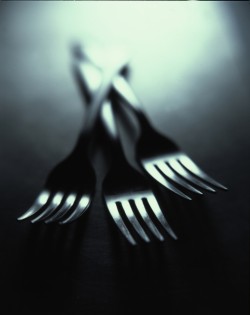Farm to stomach: Are you chewing your food enough?
I’ve never been a good chewer. When I was growing up, at the dinner table, my father and I always cleaned our plates several minutes before my mom did. Although the same is true today—I eat quite a bit faster than my mom—I do make an effort to eat more slowly. I used to joke that I was simply an efficient eater (I was saving time by inhaling my food!), but now I’m of the belief that eating more slowly, as long as it involves chewing more thoroughly, is actually a more efficient way of eating.
Thorough chewing is easier on your digestive system (we’ve all heard that our stomachs don’t have teeth!), and it significantly impacts our bodies’ ability to absorb nutrients from food. Whether or not you’ve already made a New Years resolution, here’s a closer look at why we should all make 2016 the year of slow and thorough chewing.
Properly chewing your food…
—releases more saliva, which is awesome for at least three reasons. 1. Saliva contains important digestive enzymes that start to break down your food before it even reaches your stomach. 2. Saliva lubricates food, so swallowing food is easier on your esophagus. 3. Saliva helps wash out your mouth, so you’re left with less food left behind and therefore a lower risk of plaque and all of its naughty work.
—gives your teeth a healthy workout. Chewing does to your teeth what pumping iron does to your leg and arm bones—it increases bone density, so your teeth are stronger for more thorough chewing.
—helps you maintain a healthy weight. It usually takes around 20 minutes for our brains to receive the signal that we’ve had enough food. Unfortunately, I’m usually done with my food in less than fifteen minutes! If we’re better chewers, however, our brains may have a chance to spark that “full feeling” before we’ve overeaten.
—is a boon for nutrient absorption. According to a study that involved chewing almonds, chewing food into smaller food particles improved nutrient absorption: “The more you chew, the less is lost and more is retained in the body.”
—reduces the risk of “fueling” unhealthy bacteria and fungi. When food is swallowed in larger chunks, these particles may remain undigested when they enter the intestines. There, it may be broken down by bacteria; i.e., it will putrefy and possibly cause bloating, gas, cramping, diarrhea, and constipation. Yikes. If this info doesn’t inspire you to chew better, I don’t know what will.
—eases digestion in a few ways. Digestion requires a lot of energy, so any way we can help our digestive system out is major. Poor digestion can lead to heartburn, headaches, indigestion, constipations, and low energy. Fortunately, chewing is an easy way to make things go a little more smoothly (and yes, that applies to “going” as well). If you recall my first point, more thorough chewing results in more saliva production. In addition to all of the great things saliva does, it also helps relax the lower stomach, which allows food to more easily be channeled to the intestines.
Chewing also helps digestions by prompting the stomach to release hyaluronic acid (stomach acid) in preparation to digest food. (Chewing gum will also do this, which can cause problems like bloating and overproduction of stomach acid).
—may help you enjoy your food even more! When I focus on chewing, I focus more on my food—it’s textures, it’s flavor, even it’s temperature. It simply makes eating more enjoyable for me. Plus, eating fast, even if I’m not in a rush to get somewhere, can make me feel in a rush, which is never good.
How should a person chew?
While it’s generally recommended that we chew soft foods (like fruit) 5-10 times and denser foods (like fibrous veggies) at least 30 times, counting your chews is one way to thoroughly not enjoy your meal. If you have trouble counting your chews, aim to chew your food until it’s a fairly uniform texture or until there are no distinct particles of food. Alternatively, you can aim to chew twice as long as your normally would. It may help to start off with smaller bites. When I’m at home (or at an Asian restaurant), I use chopsticks—with just about everything—because they help me pay more attention to what I’m picking up off my plate. Plus, I love chopsticks.
Also, don’t forget to chew you juices and smoothies! Even though your high-powered machine has done the chewing for you, “chewing” the liquid in your mouth will release super-important saliva.
There you have it! My chewing manifesto. I hope you think chewing is a cool as I do 🙂
More in health news: Why Being Hungry Can Be Good for Health and Wellness
Should You Eat Before You Exercise?
Get more like this–sign up for our newsletter for exclusive inspirational content!
Photo: Alejandro Escamilla via Unsplash





